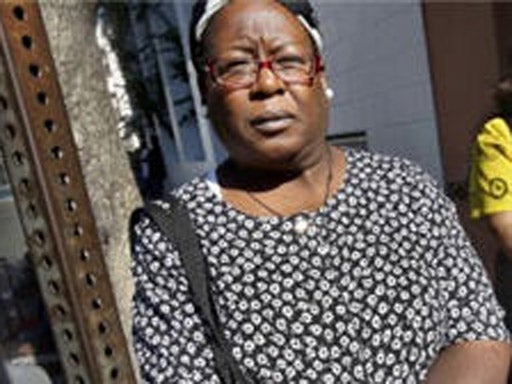Your support helps us to tell the story
From reproductive rights to climate change to Big Tech, The Independent is on the ground when the story is developing. Whether it's investigating the financials of Elon Musk's pro-Trump PAC or producing our latest documentary, 'The A Word', which shines a light on the American women fighting for reproductive rights, we know how important it is to parse out the facts from the messaging.
At such a critical moment in US history, we need reporters on the ground. Your donation allows us to keep sending journalists to speak to both sides of the story.
The Independent is trusted by Americans across the entire political spectrum. And unlike many other quality news outlets, we choose not to lock Americans out of our reporting and analysis with paywalls. We believe quality journalism should be available to everyone, paid for by those who can afford it.
Your support makes all the difference.Shirley Ree Smith spent 10 years in prison before a panel of three appeals court judges set her free, finding she'd been wrongly convicted of shaking her newborn grandson, Etzel, to death in the bedroom of a relative's house north of Los Angeles.
That was in 2006. On Monday, Smith learned that – despite persistent, wide-ranging doubts about her guilt – she must return to jail some time before Christmas. In a controversial split decision, the US Supreme Court ruled that the judges who granted her appeal had overstepped their remit. "I didn't kill my grandson. I won't go back to prison. I can't do that," said Smith, when informed of the decision. "Why won't the Supreme Court realise juries make mistakes? They're human beings; they make mistakes."
There had been no physical evidence to support Smith's original murder conviction in 1997. Instead, the jury chose to believe prosecution experts, who surmised that Etzel had been killed by shaking, over doctors testifying for the defence, who said it was a classic example of Sudden Infant Death Syndrome [Sids].
A decade into her sentence, Smith was freed on appeal. The US 9th Circuit Court of Appeals announced she had suffered a "miscarriage of justice". The evidence against her was so flimsy that there was "no demonstrable support" for the prosecution's version of events, it said.
Then came Monday's decision. Reached by a 6-3 majority at the highest court in America, it revolves around a legal technicality: although the Supreme Court says doubts over Smith's guilt are "understandable", it also believes that appeal judges have no right to simply decide that a jury reached the wrong conclusion.
"It is not the job of this court, and was not that of the 9th Circuit, to decide whether the state's theory was correct," read the Supreme Court verdict. "The jury decided that question." Only fresh evidence, or evidence of misconduct at the original trial, can be used to overturn a conviction.
Smith's case is already a cause célèbre among campaigners who say misguided expert witnesses have contributed to a slew of wrongful "shaken baby" convictions.
The three Supreme Court justices who supported Smith say it is unlikely, given recent research into the sudden death of infants, that the prosecution witnesses would have testified so vigorously today. "What is now known about shaken baby syndrome casts grave doubt on the charge leveled against Smith; and uncontradicted evidence shows that she poses no danger whatever," they wrote.
Smith's only chance of avoiding jail now revolves around a newly filed clemency petition. But her own attorney, Michael J Brennan, says the chances of it being granted are "extremely slim".

Join our commenting forum
Join thought-provoking conversations, follow other Independent readers and see their replies
Comments